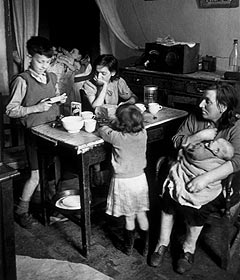Public Health Challenges
The question is often asked – why does Scotland have one of the best health services in the world but some of the poorest health?
On the surface it is an easy question to answer – good health is about much more than good health services. It is also about good housing, good food, safe neighbourhoods, having a sense of meaning in life, positive personal relationships and many other things.
Dig deeper, however, and it is clear that we should be doing better. Despite improvements in our health detailed in the Improving Public Health section, we still have some of the lowest life expectancy in the developed world.
It was not always like this. In the first half of the 20th century people in Scotland were living longer than those in France, Spain and Italy. That shows there is nothing inevitable about our current poor health status. It was better once and it can be again.
In the past 60 years, the health service has met many challenges. In its early days, the main threat came from infectious diseases which have all but disappeared, thanks to the successful childhood immunisation programmes introduced from the 1950s onwards.
New challenges then emerged in the form of heart disease and cancer. Successful programmes and improved treatments have seen death rates fall significantly in recent years and this work continues.
The threat of HIV infection caused considerable concern in the 1980s but prompt action was taken to halt the spread of the virus among drug users. Similarly, positive action was taken to improve hygiene regulations following two high profile food poisoning outbreaks – the typhoid epidemic in Aberdeen in 1964 and the E-coli outbreak in Wishaw in 1996.
Work continues in Scotland and throughout the UK to respond to other potential problems such as the threat of an avian flu pandemic.
However, our greatest challenge remains improving the health of the poorest sections of our society. There is a 10 year gap in life expectancy between people living in the most and least deprived areas of Scotland. Narrowing this gap is one of the health service’s key priorities.
The Scottish Government has established a Ministerial Task Force on Health Inequalities to examine and address this problem. It is also focusing on the early years of life in Scotland which are crucial for subsequent health and wellbeing in adulthood.
The early identification of children at risk and the provision of appropriate and sustained support can make a real difference to their future health and life prospects.
Research is providing us with new insights into the factors that influence health. This offers Scotland a real opportunity to develop new approaches to health development and improvement to help us shake off our reputation as “the sick man of Europe”.
Dr Harry Burns
Chief Medical Officer
- Further information
- Scottish Public Health Observatory
- Glasgow Centre for Population Health

“Variations in life expectancy have increased consistently over the past 10 years.
Men living in Scotland’s least deprived areas now have a life expectancy 10.7 years longer than men in the most deprived. For women, the life expectancy gap is 6.8 years.”
Better Health, Better Care. Scottish Government 2007.
